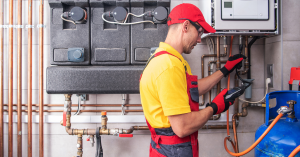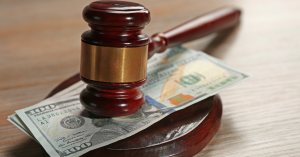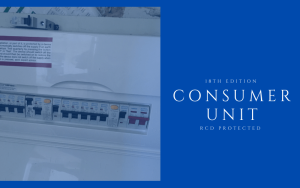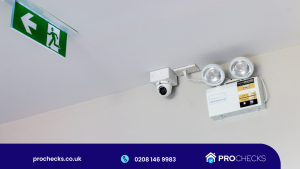Property managers and landlords have a duty of care to their tenants when it comes to the safety of their properties. One important but often overlooked area is gas safety, which requires landlords to hold a valid Gas Safety Certificate (GSC) for each property they manage or own.

In this article, we’ll look at why having such a certificate is so vitally important and how you can ensure your rental properties are compliant with regulations.
As an expert in both property management and gas safety, I’m here to tell you that GSCs should be considered essential for any landlord or property manager. Without one, not only could you face hefty fines from regulatory authorities, but more importantly you risk putting your tenant’s health and wellbeing on the line.
It’s simply not worth taking the chance – get up-to-date on gas safety now!
What Is A Gas Safety Certificate?
As a property management expert, it is essential to understand what a gas safety certificate is and why landlords need one for their properties.
A gas safety certificate is an official document that attests that the landlord has met all of the required legal gas safety requirements in order to ensure safe operation at their premises. This means carrying out regular checks on all appliances connected to the mains gas supply, as well as any flues or chimneys that are used with these devices.
These checks must be done annually by a Gas Safe registered engineer who will then issue the certificate upon completion of the inspection.
Gas safety protocols should always be followed when dealing with mains gas supplies; failure to do so can result in severe injury or even death due to carbon monoxide poisoning or fire hazards caused by poor maintenance.
As such, it is important that landlords take responsibility for ensuring they have up-to-date certificates which prove they have met all necessary regulations concerning their mains gas appliance installations and usage. Without this proof, landlords could face hefty fines and other penalties from local authorities if there were ever an incident related to unsafe use of mains gas at their premises.
It’s clear why having a valid and current Gas Safety Certificate is vital: not only does it provide assurance that your property meets high standards of safety but also offers peace of mind knowing you are protecting people living at the premises from avoidable risks associated with using mains gas supplies.
So don’t delay – make sure you get yours today!
Why Is A Gas Safety Certificate Important?

A Gas Safety Certificate is vital for landlords to have in order to protect their property and tenants. Without one, a landlord puts both the building and its occupants at risk of accidental carbon monoxide poisoning or other potentially hazardous gas related incidents.
Here are four key reasons why having a Gas Safety Certificate is so important:
- It ensures compliance with regulations – A Gas Safety Certificate provides proof that all appliances in the rental property have been checked by an accredited engineer and meet safety standards as required by law. This protects landlords from potential fines or legal action if any appliance malfunctions due to negligence on their part.
- It reduces risks associated with faulty appliances – Regular checks make sure that any faults within the property’s gas systems can be identified before they become dangerous, reducing the chances of accidents caused by malfunctioning equipment.
- It guarantees tenant safety – By ensuring that all gas appliances are functioning correctly, landlords provide assurance that their tenants will remain safe while living in their properties. It also helps them avoid costly damage claims should anything go wrong due to neglected maintenance checks over time.
- It keeps insurance premiums low – Having valid certification for your rented property demonstrates responsibility when it comes to managing your assets, resulting in lower insurance costs for landlords who take this step seriously.
The importance of obtaining a Gas Safety Certificate cannot be underestimated; not doing so could result in loss of reputation and financial repercussions for landlords, as well as putting lives at risk from unsafe conditions in residential properties.
What Are The Regulations For Gas Safety Certificates?
It is understandable for landlords to be hesitant about obtaining gas safety certificates for their properties. After all, there are costs involved and the paperwork can at times seem overwhelming. However, not having a valid certificate carries serious legal implications and could even put tenants in danger.
It is essential that landlords take steps to ensure they meet the necessary registration requirements and stay updated with any changes or updates regarding gas safety legislation.
The regulations surrounding gas safety certificates vary from country to country, but generally speaking each property needs an annual check-up by a certified professional known as a Gas Safe Engineer. The engineer will make sure all of the appliances are safe to use and records must be kept of these checks; this includes providing the tenant with a copy if requested.
Every landlord should have basic knowledge of what’s required when it comes to gas safety certifications and maintenance so they can remain compliant while also protecting their tenants from potential harm.
Failure to comply with gas safety legislation results in significant fines and penalties which nobody wants! Not only does keeping up with your gas safety obligations protect you legally, but it can also help keep your rental business running smoothly since happy tenants mean less complaints – making sure everyone stays safe is always worth the effort.
Who Can Issue A Gas Safety Certificate?
Now that we understand the regulations for gas safety certificates, it’s important to know who can issue them.
Gas safety certificates must be issued by qualified and certified technicians or gas engineers. These individuals are professionally trained and licensed in order to inspect a property’s gas installation and appliances on an annual basis.
Here is what landlords need to look out for when selecting a technician:
- They should belong to one of these two bodies – The Gas Safe Register (formerly CORGI) or Oftec.
- Technicians should have the appropriate qualifications and accreditation needed to carry out inspection work safely.
- Make sure they are experienced with all your types of gas equipment before hiring them.
- Technicians must provide you with valid documentation after completing their inspections.
When it comes to ensuring safe gas installations in rented properties, having the right people onboard is essential. Landlords should always make sure that the technicians they hire are properly certified and able to do the job correctly. This will help keep tenants safe from potential hazards caused by poor maintenance or incorrect use of equipment over time.
How Do I Obtain A Gas Safety Certificate?
For landlords, it’s essential to obtain a Gas Safety Certificate for their properties.
To do so, they’ll need to find a Gas Safe Registered Engineer to carry out an inspection and provide the certificate.
I’d recommend organising the inspection as soon as possible, as it’s an important part of meeting legal requirements.
Once the inspection is complete, the engineer will provide the certificate, confirming the property is safe for use.
Finding A Gas Safe Registered Engineer
Finding a Gas Safe Registered Engineer is an important part of ensuring your property has the correct gas safety certificates in place. It’s essential to ensure that you are choosing professionals with expertise and experience who can conduct regular checkups on your appliances.
To start, ask friends or family if they have any recommendations for local engineers that they have previously used – this will give you some peace of mind knowing that they’ve been recommended by people you trust.
Alternatively, look online for certified Gas Safe registered engineers in your area and compare their services against each other before making a decision. Be sure to read customer reviews from previous clients so you know what kind of service to expect.
Finally, make sure that the engineer you choose offers competitive rates and reasonable payment terms so it works best for both parties involved. With these tips in mind, finding the perfect person for the job should be easy!
Organising An Inspection And Certificate
Once you’ve found the right engineer, it’s time to organise an inspection and get your certificate.
The best way to do this is by arranging a convenient appointment with your chosen engineer – they’ll be able to visit at a time that works for everyone involved.
It’s important to make sure that all relevant people are present during the inspection so there can be no disputes afterwards.
When hiring an inspector, always check that they are fully qualified and licensed before proceeding.
This will help ensure you have complete confidence in their abilities and knowledge of gas safety regulations.
With everything prepared and organised beforehand, obtaining your Gas Safety Certificate should be smooth sailing!
What Should I Look For In A Gas Safety Certificate?
When it comes to gas safety in rental properties, few things are as important as having a valid gas safety certificate. It is vital for landlords and property managers alike to regularly check their gas installations for any potential hazards. Not doing so can be extremely dangerous, leading to the risk of carbon monoxide poisoning or worse.
A properly documented and up-to-date Gas Safety Certificate serves not only as evidence that your property has met all the necessary regulatory requirements but also offers peace of mind knowing you have gone above and beyond what most people consider normal levels of safety precautions.
Any professional landlord should make sure they always have an active certificate on file at their premises – this will help demonstrate their commitment towards providing quality living conditions for tenants and protecting them from potentially hazardous situations.
It’s essential to make sure your certifier is qualified and experienced in conducting these assessments. Look out for certified professionals with experience in working with landlords and tenants; they’ll be able to provide detailed feedback on any areas where further improvements may be needed.
Additionally, ask about how often checks need to be done – some certificates are valid up to 12 months, depending on the equipment installed in the property. Taking steps like these will ensure that you remain compliant with current regulations while keeping your tenants safe from harm.
When Should A Gas Safety Certificate Be Renewed?
When it comes to a landlord’s responsibility for providing safe and compliant housing, the gas safety check is vital.
The Gas Safety (Installation and Use) Regulations 1998 require that landlords have an annual gas safety check carried out by a registered engineer on any relevant appliance in their rental property – this includes all pipe work, flues, chimneys and ventilation.
The renewal process of a gas safety certificate should not be overlooked as it is essential evidence of the compliance with Landlord’s legal obligation to ensure they are safe.
It is also important to remember that if you do not keep your certificates up-to-date then you may find yourself liable under law for any accidents or harm caused due to negligent maintenance.
It is therefore recommended that a landlord arranges for a qualified Gas Safe engineer to carry out the following checks during each inspection:
- Check appliances for gas tightness
- Test standing and working pressure when appropriate
- Inspect burners for correct operation
- Check safety devices operate correctly
- Ensure adequate combustion air supply
By completing these steps, detailed records can be kept which will help demonstrate compliance with health & safety legislation and provide assurance that tenants are living in an environment that meets all necessary standards.
What Are The Penalties For Not Having A Gas Safety Certificate?

Every year in the UK, tens of thousands of landlords are subject to hefty fines for failing to have a valid gas safety certificate for their properties. According to recent statistics from the Health and Safety Executive (HSE), over 22,500 landlord prosecutions were made for inadequate or no gas safety certificates in 2019 alone!
For any property owner who is renting out their buildings, it’s absolutely essential that they have a current gas safety certificate on hand at all times. Not only does this guarantee tenants’ safety by ensuring that appliances and pipework are operating correctly, but it also prevents landlords from experiencing harsh enforcement consequences and legal implications.
A failure to comply with these regulations can result in prosecution under health and safety legislation and may even lead to an unlimited fine or imprisonment if negligence is found to be involved.
As such, it’s crucial that landlords ensure they conduct regular checks on their rental property’s gas systems – not just once per year as required by law – but routinely throughout the tenancy period so they remain within compliance and avoid facing serious penalties.
What Are The Safety Measures Needed For Gas Appliances?
Now that we have discussed the legal implications of not having a gas safety certificate, it is important to understand what measures are needed for ensuring safe usage of gas appliances. As a property manager or landlord, you must make sure your tenants and employees remain safe in the presence of potential risks associated with these appliances.
Gas testing should be conducted on all properties at least annually by an authorized engineer who has been certified to do so by Gas Safe Register. This will ensure any faulty components are identified before they can cause serious harm.
It is also essential that all gas equipment installed within the premises complies with current regulations as well as being regularly serviced and maintained to reduce the risk of carbon monoxide poisoning from malfunctioning boilers or cookers.
Regular maintenance checks should include checking flue pipes, ventilation systems, boiler pressure levels and inspecting chimneys for obstructions such as birds’ nests or debris blocking airways.
Regular inspection also provides landlords with peace of mind knowing their properties comply with health and safety standards while helping them meet their obligations under current legislation regarding gas safety certificates. Failure to adhere to this could result in significant fines or even prosecution depending on the severity of negligence displayed.
How Do I Ensure My Property Is Compliant With Gas Safety Regulations?
Landlords have a duty to ensure the safety of their tenants and property when it comes to gas appliances.
To be compliant with gas safety regulations, landlords should undertake annual gas checks on all properties that use natural gas for heating or cooking purposes. During these inspections, qualified Gas Safe engineers must check each appliance is safe and working correctly.
It’s important that landlords keep records of the inspection results which must include details such as make, model, location and serial number of the appliances inspected.
In addition, they need to provide copies of the report to both the tenant and local authority within 28 days after completion. Further information related to landlord responsibilities can be found in The Gas Safety (Installation & Use) Regulations 1998.
Tenants also play an important role as it’s their responsibility to grant access for any repairs or maintenance work required during these inspections.
It’s essential that landlords communicate clearly with tenants about upcoming appointments and necessary arrangements prior to any engineer visiting the property. Taking these steps will help protect your rental business from potential legal action due to non-compliance issues with gas safety regulations.
Frequently Asked Questions
How Often Should I Have A Gas Safety Certificate Inspection?
It’s like a yearly check-up for your property: gas safety certificates are essential to ensure the health and wellbeing of your tenants.
As a property manager or landlord, you need to be aware of the legal implications associated with not having up-to-date certification and the potential risks that come with it.
To keep everyone safe, it is recommended to have regular inspections at least once a year – just as one would get their car serviced annually.
With this in mind, you can rest assured knowing that all necessary safety measures have been taken into account.
Who Is Responsible For The Cost Of A Gas Safety Certificate Inspection?
When it comes to who is responsible for the cost of a gas safety certificate inspection, landlords have certain rights and tenants have certain obligations.
Generally speaking, the landlord is responsible for paying all costs associated with having their property inspected by a qualified gas safety engineer and obtaining the necessary certificate; this includes any fees related to labour or materials required to repair or replace faulty or outdated appliances in order to pass the inspection.
Tenants are obligated to provide access and cooperate with the inspector so that they can properly assess any issues and make sure that all relevant regulations are met.
How Long Does A Gas Safety Certificate Inspection Take?
A gas safety certificate inspection can take anywhere from one to three hours, depending on the complexity and size of your property.
All inspections must meet qualifying criteria set by a certified inspector or engineer, so it’s important to make sure you have all necessary preparation in place before starting the process.
Experienced inspectors are well-equipped to handle any challenges that may arise during an inspection due to their knowledge and expertise.
With proper planning and management, landlords can get through this process quickly with minimal disruption and ensure their properties maintain safe standards for tenants.
What Should I Do If I Discover A Gas Leak During A Gas Safety Certificate Inspection?
If you discover a gas leak during a gas safety certificate inspection, the first thing that needs to be done is to identify and address any risks.
You should ensure that all appliances are turned off immediately, and then contact your local Gas Safe registered engineer who will be able to assess and rectify the issue.
Once they have fixed it and tested for compliance with regulations, they can issue you with a new gas safety Certificate.
It’s essential that landlords take this step – not only to protect their tenants but also so they can stay compliant with legal requirements.
What Are The Risks Of Not Having A Valid Gas Safety Certificate?
Not having a valid gas safety certificate can be incredibly dangerous, and it’s strictly against mandatory regulations.
The risks include the potential for carbon monoxide poisoning – an invisible yet deadly risk that could be lurking in your property if you don’t have a proper inspection done.
Property management experts strongly advise landlords to stay up-to-date with their gas certificates; without one, you’re putting yourself at serious risk of harm.
Conclusion
Having a valid Gas Safety Certificate is essential for landlords to protect their tenants and properties.
It’s like having an insurance policy: it means you’re covered if something goes wrong.
As a property manager or gas safety expert, I highly recommend that landlords ensure they obtain this important certificate every 12 months.
Regular inspections are the best way to detect any potential problems early on, so that appropriate action can be taken before it becomes too costly or dangerous.
By doing this, landlords can rest assured knowing that their tenants’ safety is being looked after properly.











3 thoughts on “Why Landlords Need To Have Gas Safety Certificate For Their Properties”
I was suggested this web site by my cousin Im not sure whether this post is written by him as no one else know such detailed about my trouble You are incredible Thanks
Its like you read my mind You appear to know so much about this like you wrote the book in it or something I think that you can do with a few pics to drive the message home a little bit but other than that this is fantastic blog A great read Ill certainly be back
“Fantastic!”